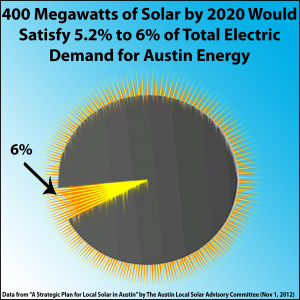Updating the the Austin Energy Resource, Generation and Climate Protection Plan to 2020 to become the Austin Energy Resource, Generation and Climate Protection Plan to 2024 probably doesn’t sound super exciting, but there’s almost certainly some aspect of the choices that will soon be made on your behalf that you care about.
 1. Climate Change: I’m not going to try to convince anyone reading this that our planet’s climate is changing and that humans are largely responsible for that change. Nor am I going to try to convince you that those changes are going to be largely detrimental to human prosperity. But if you already recognize those two basic truths, then you will definitely want to listen up. Austin Energy is proposing to not only run Austin’s portion of the Fayette coal plant until 2025, but also to dramatically increase its use of natural gas by adding a new 800 megawatt gas plant to its energy portfolio. That’s bigger than Austin’s portion of Fayette. And although natural gas emits less carbon dioxide per kilowatt hour of energy production than burning coal, once the substantial impact of the roughly 3% of gas that leaks into the atmosphere during extraction, processing and transportation is accounted for, natural gas is almost as harmful to the climate as coal. That’s because the primary component of natural gas, methane, is 87 times more powerful of a greenhouse gas than carbon dioxide over 20 years. Although many people focus on the 100 year time frame when talking about climate change, we can’t afford to ignore our more immediate future. Central Texas has already experienced its share of climate impacts over the past few years in the form of drought, wildfires and floods. We must stop those impacts from worsening at a greater rate than they already will be. Natural gas isn’t going to save us. Even without the massive problem of leaking methane, burning gas instead of coal only decreases our climate impact by about half, so it’s not a long term solution anyway – the best it could have been was a stopgap. Instead of investing in infrastructure that won’t get us where we need to be, we can make better decisions now.
1. Climate Change: I’m not going to try to convince anyone reading this that our planet’s climate is changing and that humans are largely responsible for that change. Nor am I going to try to convince you that those changes are going to be largely detrimental to human prosperity. But if you already recognize those two basic truths, then you will definitely want to listen up. Austin Energy is proposing to not only run Austin’s portion of the Fayette coal plant until 2025, but also to dramatically increase its use of natural gas by adding a new 800 megawatt gas plant to its energy portfolio. That’s bigger than Austin’s portion of Fayette. And although natural gas emits less carbon dioxide per kilowatt hour of energy production than burning coal, once the substantial impact of the roughly 3% of gas that leaks into the atmosphere during extraction, processing and transportation is accounted for, natural gas is almost as harmful to the climate as coal. That’s because the primary component of natural gas, methane, is 87 times more powerful of a greenhouse gas than carbon dioxide over 20 years. Although many people focus on the 100 year time frame when talking about climate change, we can’t afford to ignore our more immediate future. Central Texas has already experienced its share of climate impacts over the past few years in the form of drought, wildfires and floods. We must stop those impacts from worsening at a greater rate than they already will be. Natural gas isn’t going to save us. Even without the massive problem of leaking methane, burning gas instead of coal only decreases our climate impact by about half, so it’s not a long term solution anyway – the best it could have been was a stopgap. Instead of investing in infrastructure that won’t get us where we need to be, we can make better decisions now.
2. Jobs: Developing renewable energy sources creates 3 times as many jobs as developing fossil fuel energy sources per dollar invested. Whereas a large chunk of the cost connected to a coal plan or a gas plant is for the coal and gas, the wind and sun are free. So, instead of paying for the privilege of burning a limited resource, we can pay people to harness the energy from free and unlimited resources.
Across the U.S., solar energy jobs grew 20% from 2012 to 2013, compared to average job growth across all industries of 1.9%. A large percentage of that growth was in Texas, but Texas still ranks 44th in solar jobs per capita. Increasing Austin Energy’s solar goal will bring more jobs to Texas, but it’s increasing the local solar goal that will have the most impact on local job creation. The Austin Local Solar Advisory Commission unanimously recommended that Austin Energy’s solar goal for 2020 be increased from 200 megawatts (MW) to 400 MW. It also recommended that at least half of that solar development be local and at least half of that local solar be customer controlled (that’s what you see on residential and business rooftops and yards). According to the LSAC’s calculations done using the National Renewable Energy Laboratory (NREL) Jobs and Economic Development Impact (JEDI) model, the $60 million it would take to develop that amount of local solar would bring the Austin area a net of $300 million in local economic benefits – wages, taxes, etc. If Austin Energy adopts policies to give preference to local companies who hire local workers, our community can benefit even more. On the other hand, we are currently sending $80 million to Montana each year for the coal we burn in the Fayette coal plant.
3. Water: If you live in central Texas, I don’t need to tell you that water is a huge issue – in fact it’s just a big issue for Texas that the Legislature, with voter approval appropriated $2 billion dollars to fund water projects, with 20% of those funds to be used on water conservation efforts. We can’t make it rain more, so we are going to have to make some choices about what we want to use water for. The Fayette coal plant, which Austin Energy owns one third of, needs about 5 billion gallons of water per year to operate. And lest you start thinking natural gas plants are the answer, know that over 39 billion gallons of water was used in fracking jobs in Texas between January 2011 and May 2013. Producers in the Eagle Ford Shale play are especially wasteful, using an average of 4.4 million gallons of water per well. That’s water that can’t be used for domestic, commercial, industrial, agricultural, or ecosystem uses.
Tell Austin Energy to focus investment on drought proof energy sources like wind and solar.
4. Health: Air pollution from burning coal and extracting natural gas are taking a real toll on human health in Texas. The Fayette coal plant is responsible for over $55.5 million in health impacts from air pollution. Those impacts include asthma attacks, chronic bronchitis, heart attacks and the associated hospital visits and deaths. Even so, Austin Energy has proposed running its portion of Fayette until 2025.
Lack of regulation over the natural gas industry, which has operations strewn across vast areas has resulted in a tragic disregard for human well being. If you haven’t already, read this excellent piece of investigative journalism about how your fellow Texans are being assaulted with toxic chemicals in the Eagle Ford Shale area. Instead of building a large new gas plant to drive up demand for dangerous fracking, Austin Energy should focus on growing its renewable energy portofolio with more wind and solar and perhaps some geothermal energy.
Air pollution is much more than an environmental issue – it’s a public health issue. That’s why you find medical professionals and health advocates supporting a transition to clean energy.
5. Affordable Energy: Wind and solar energy are competitive with coal and natural gas already. Meanwhile, electricity from coal plants is going to get more expensive because of various regulations to limit pollution. Natural gas prices are low now, but have fluctuated greatly over time, making a big bet on natural gas risky. When natural gas prices go up, Austin Energy raises our fuel charge to recover those costs. Since affordable wind and solar are available now and can assure us a predictable price for 10-20 years, why would we not make those energy sources our priority? Austin Energy has done a great job getting good wind contracts to keep customer rates low and is set to achieve its 35% renewable energy goal 4 years early in 2016.
Take Action:
Austin Energy is holding 3 stakeholder meetings to gather public input on the Austin Energy Resource, Generation and Climate Protection Plan update to 2024.
- Tuesday, February 25: 10 am – 12 pm (noon)
- Tuesday, February 25: 6 pm – 8 pm
- Thursday, February 27: 1 pm – 3 pm
This is your chance to help determine how the money you pay for your electric bills is invested by our publicly owned utility.






